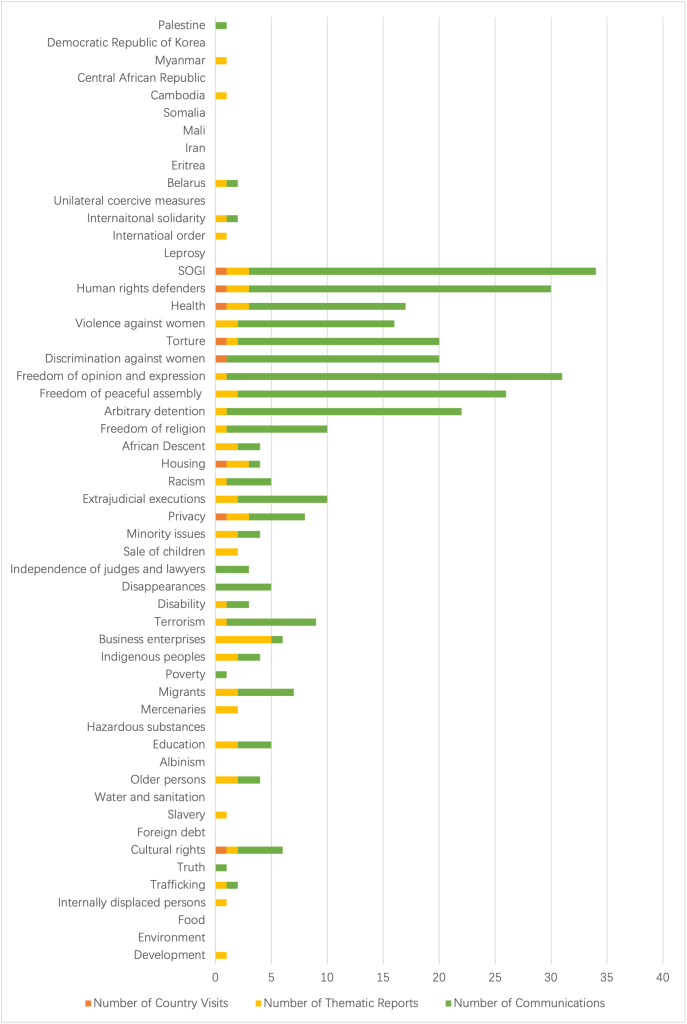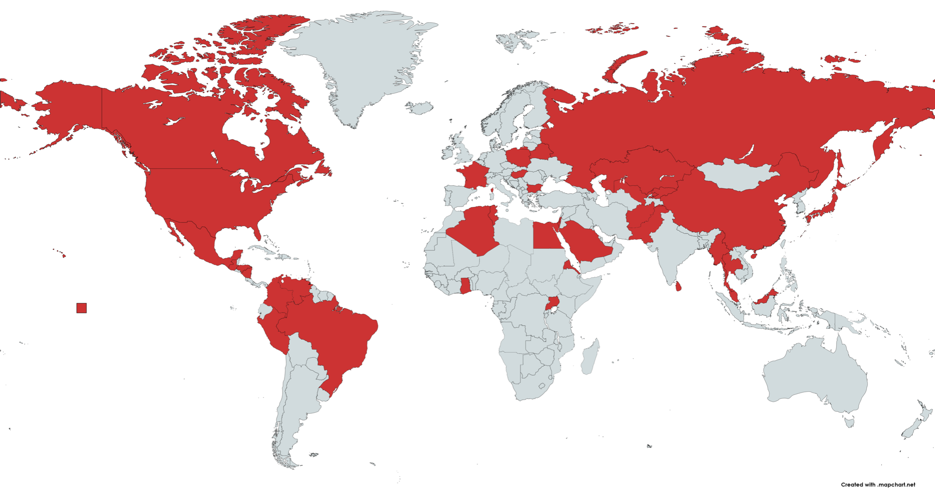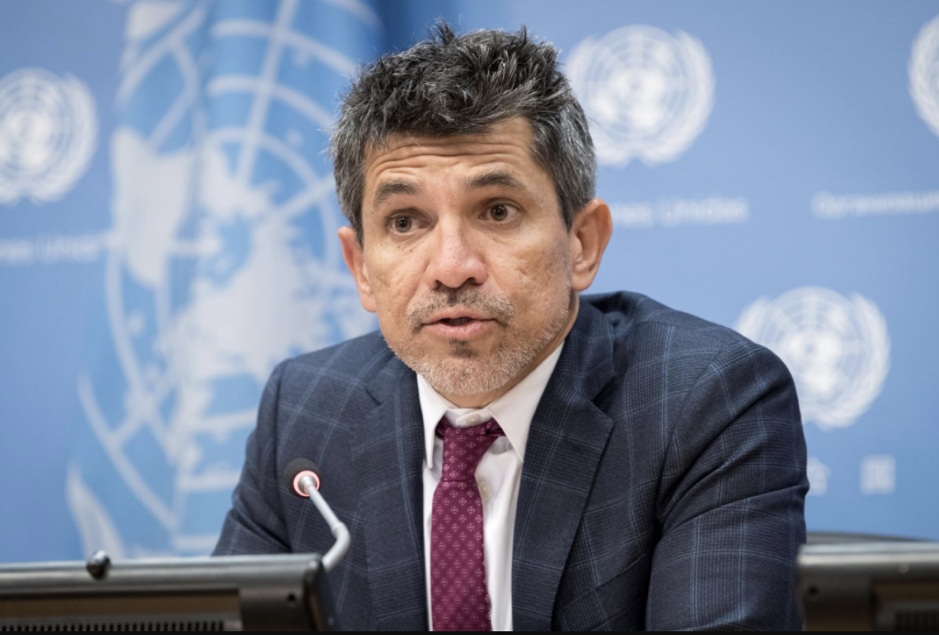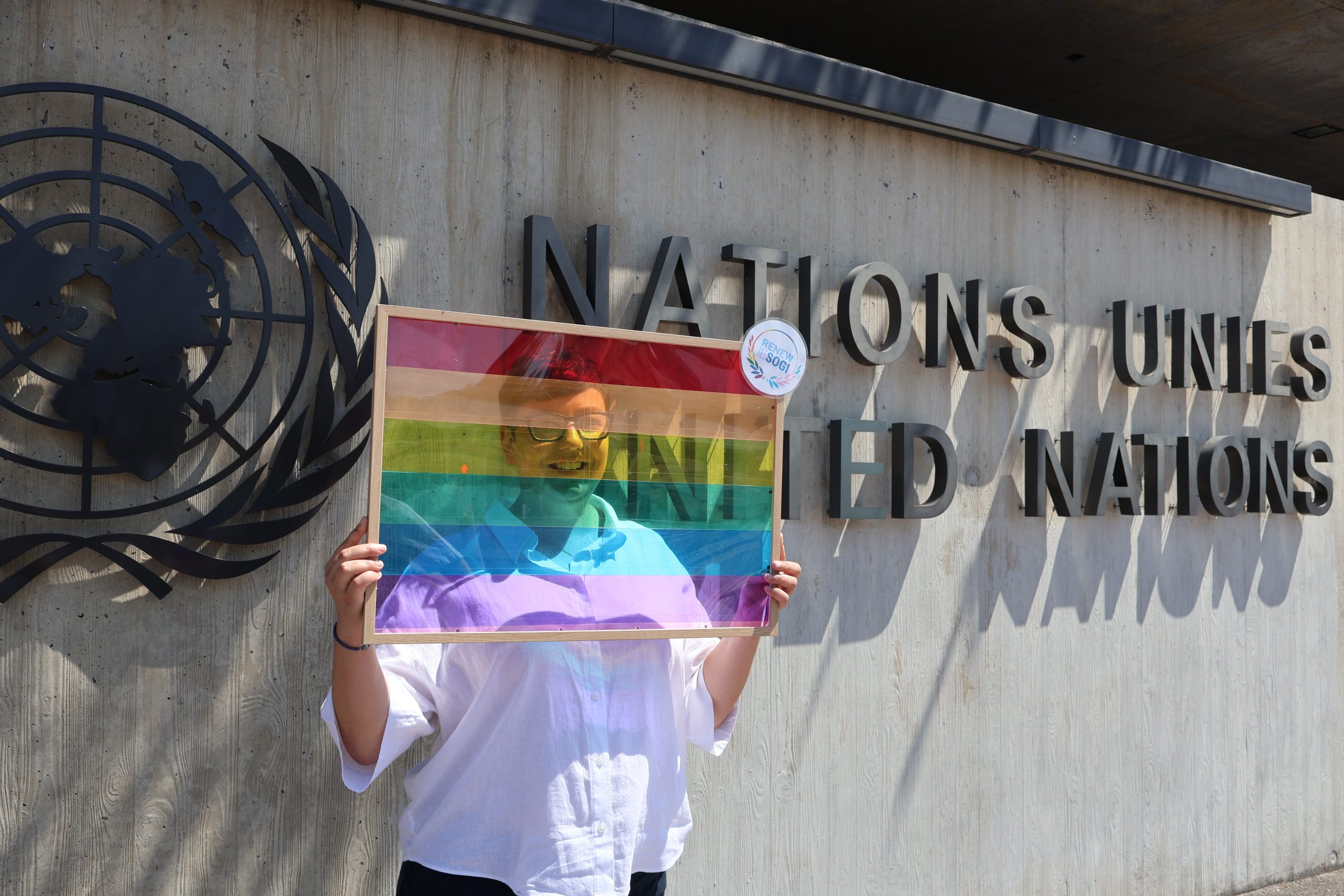An analysis prepared by ILGA and ISHR indicates that over the past year thematic and country UN Special Procedures mandate holders have increased their engagement with SOGIESC topics and tackled different issues and human rights violations suffered by LGBTI persons. This analysis stems from an update of a series of factsheets prepared by ILGA and ISHR, which list the references and recommendations made regarding LGBTI persons and SOGIESC in communications, thematic reports and country visits by mandate holders.
One important development in the update this year was the inclusion of country mandates to the scope of analysis, covering the 10 mandates that were active in 2021. This includes the Special Rapporteurs and Independent Experts on the situation of human rights in Belarus, Somalia, Mali, Eritrea, Iran, Cambodia, Central African Republic, Myanmar, Democratic People’s Republic of Korea and Palestine.
Overall, in relation to LGBTI topics, the thematic Special Procedures sent 52 new communications, issued 8 reports on country visits and published 54 thematic reports.
We welcome the ongoing attention these experts are paying to SOGIESC human rights issues, including particular attention to the situation of LGBTI rights defenders . In that vein we acknowledge the references made by the Special Rapporteur on human rights defenders, the Working Group on arbitrary detention and the Working group on people of African descent. We also commend the strong LGBTI focus adopted by the Special Rapporteur on health, as well as good reference to LGBTI people by the Special Rapporteur on older persons. We encourage mandate holders to further strengthen their analysis of specific populations within LGBTI communities, such as LBQ women, trans or intersex persons, BIPOC people with diverse SOGIESC, LGBTI migrants and refugees and LGBTI persons with disabilities.
Find out more about the trends in 2021 below! You can find the updated factsheets here.
Which experts include LGBTI issues most regularly?
The mandates that made the most regular references to SOGIESC issues were:
- the Independent Expert on violence and discrimination on the basis of SOGI (34 items: 2 SOGIESC-inclusive thematic reports, 1 country report and 31 communications on LGBTI relevant topics);
- the Special Rapporteur on freedom of expression (31 items);
- the Special Rapporteur on human rights defenders (30 items);
- the Special Rapporteur on freedom of peaceful assembly and association (26 items);
- the Working Group on arbitrary detention (22 items)
- the Working Group on discrimination against women (20 items);
- the Special Rapporteur on torture (20 items).
2021 SOGIESC thematic reports, country visits and communications by mandates:

Communications
52 new communications focused on SOGIESC – letters concerning allegations of human rights violations – were sent by thematic and country mandates for the period from 21 November 2020 to 31 December 2021.
31 communications were made with the Independent expert on SOGI. In addition, 21 other communications made by the remaining mandates that contained LGBT references were considered in this analysis, even when they were not co-issued by IE on SOGI. Therefore, the other top mandates were the Special Rapporteur on freedom of expression (30 communications), the Special Rapporteur on human rights defenders (27 communications) and the Special Rapporteur on peaceful assembly and association (24 communications). In a welcome advance, the Special Rapporteur on truth, justice and reparation and the Special Rapporteur on Belarus made their first communications covering LGBTI topics.
Communications covering SOGIESC issues were sent to 36 states from all UN geographical clusters: Afghanistan, Algeria, Belarus, Brazil, Bulgaria, Canada, China, Colombia, Egypt, Eritrea, France, Ghana, Guatemala, Honduras, Hungary, Israel, Japan, Kazakhstan, Kyrgyzstan, Malaysia, Mexico, Myanmar, Nicaragua, Pakistan, Peru, Poland, Russian Federation, Saudi Arabia, Sri Lanka, Thailand, Tunisia, Turkey, Uganda, United States of America, Uzbekistan, Venezuela.
Countries that received communications:

Country visits
Due to the Covid-19 pandemic, the number of country visits has once again been limited this year. However, in 2021 Special Procedures still presented 8 reports on country visits with references to SOGIESC. This covers 8 countries in all five UN geographical clusters.
Country visit reports published:

The countries include: Fiji, Maldives, New Zealand, Peru, Romania, South Korea, Tunisia and Tuvalu.
Despite the decline on country visits this year, the Special Rapporteur on the right to privacy, presented their first SOGIESC-inclusive country report in 2021.
Thematic reports
Special Procedures also included SOGIESC elements in their thematic reports to the Human Rights Council and General Assembly. In 2021, 54 reports (slightly less than 50% of all thematic reports) made references to SOGIESC related topics, with 15 of these reports – set out in the table below – including good or strong references to LGBTI populations.
2021 Thematic reports with good or strong SOGIESC references:
| Mandate |
Report Topic |
References |
|
WORKING GROUP OF EXPERTS ON PEOPLE OF AFRICAN DESCENT
|
The Urgency of Now: Systemic Racism and the opportunities of 2021
August 2021 (76th Session GA)
|
Good references to LGBTQI, homophobia, and gender identity and gender expression (Covid-19 movement restrictions on the base of gender affecting transgender people, right to health and homophobia, and attacks against LGBTQI human rights defenders of African descent)
Paras. 37, 64, 69.
|
|
SPECIAL RAPPORTEUR ON THE PROMOTION AND PROTECTION OF THE RIGHT TO FREEDOM OF OPINION AND EXPRESSION
|
Artistic Freedom of Expression
July 2020 (44th Session (HRC) |
Good reference to LGBT, sexual minorities (suppression of LGBTQ activists, artists, and artistic events and expression)
Para. 1, 28, 32-35. |
|
WORKING GROUP OF EXPERTS ON ARBITRARY DETENTION
|
Deprivation of liberty of human rights defenders, forcible transfers of individuals and prohibition of arbitrary detention, and the Declaration against Arbitrary Detention in State-to-State relations.
August 2021 (48th Session HRC) |
Good references to LGBTI. (In the context of significant risk of detention for LGBTIQ+ defenders; Experience of liberty; discriminatory grounds)
Paras. 6, 12, 14, 39, 40, 41, 42, 43, 44, 45, 46, 47, 49 of Annex
(Deliberation No. 12 on women deprived of their liberty) |
|
WORKING GROUP ON THE ISSUE OF HUMAN RIGHTS AND TRANSNATIONAL CORPORATIONS AND OTHER BUSINESS ENTERPRISES
|
Fifth Regional Forum for Latin America and the Caribbean on Business and Human Rights
June 2021 (47th Session HRC) |
Good references to LGBTI (Special attention to LGBTI people in due diligence processes; considering the effects of the pandemic on LGBTI people; gender mainstreaming; Combating discrimination; differential human rights impact; mainstreaming the gender perspective in business)
Paras. 4, 45, 96, 98, 99, 100, 101, 106d, 108e, 108k
|
|
SPECIAL RAPPORTEUR IN THE FIELD OF CULTURAL RIGHTS
|
COVID-19, culture and cultural rights
February 2021 (46th Session HRC) |
Shrinking civic space, spreading fake information, online harassment, but also opportunity for increased connections in virtual spaces (paras. 27, 28, 31, 48, 79l)
|
|
SPECIAL RAPPORTEUR ON THE PROMOTION AND PROTECTION OF THE RIGHT TO FREEDOM OF OPINION AND EXPRESSION
|
Gender justice and freedom of opinion and expression. July 2021
(76th Session GA) |
Suppression of SOGI expression, hate speech, laws prohibiting “LGBT propaganda” (paras. 8, 11-12, 17-19, 23-24, 27-31, 34, 37, 41, 55, 83, 90, 112f, 115, 121d)
|
|
SPECIAL RAPPORTEUR ON THE RIGHT OF EVERYONE TO THE ENJOYMENT OF THE HIGHEST ATTAINABLE STANDARD OF PHYSICAL AND MENTAL HEALTH
|
Sexual and reproductive health rights: challenges and opportunities during COVID-19
July 2021 (76th Session GA)
|
Strong references to SOGIESC. (Links State-sponsored homophobia, heteronormativity, legal restrictions on consensual same-sex acts to colonialism; underscores specific sexual and reproductive health needs of individuals with diverse gender identities; call to end involuntary sterilization, medical procedures related to transition, including surgeries, hormonal therapies, medical or psychosocial appraisals or treatments; access to gender affirming treatment for trans and gender-diverse children and adolescents)
Paras. 1, 4, 6, 9, 10, 11, 19, 20, 21, 45, 46, 47, 48, 54, 57, 82, 87
|
| |
Strategic priorities of work
June 2021 (47th Session HRC)
|
Strong references to SOGIESC.
(Vulnerability of LBT women to violence and homophobic rape; call to end the use of ’corrective rape’ term; disproportionate effects of intersectional discrimination in the context of sexual and reproductive health on LGBTI people; abuse of LGBT people by untrained health-care workers, including public humiliation, verbal abuse, psychiatric evaluations, coerced sterilization, State-sponsored forcible anal examinations for the prosecution of suspected homosexual activities, invasive virginity examinations, hormone therapy and genital normalizing surgeries)
Paras. 15, 16, 20, 23(a), 45, 54, 55, 56, 57, 58, 59, 60, 64, 66, 73, 75, 77, 90, 103
|
|
SPECIAL RAPPORTEUR ON THE SITUATION OF HUMAN RIGHTS DEFENDERS
|
Final warning:
death threats and killings of human rights defenders December 2020 (46th Session HRC)
|
Gendered threats, need support for defenders from vulnerable groups
(paras. 41, 57, 65, 67, 69, 101, 115d) |
|
SPECIAL RAPPORTEUR ON MINORITY ISSUES
|
Minorities, equal participation, social and economic development and the 2030 Agenda for Sustainable Development. July 2021 (GA76) |
Good references to LGBT(paras. 43, 45, 78, 79);
|
|
|
Hate speech, social media and minorities. March 2021 (HRC46)
|
Good SOGIESC references (paras. 60g, 60h, 87, 88, 89)
|
|
INDEPENDENT EXPERT ON THE ENJOYMENT OF ALL HUMAN RIGHTS BY OLDER PERSONS
|
The human rights of older women: the intersection between ageing and gender (GA76)
|
Good reference to SOGIESC, especially on the situation of older LBTI women
(paras. 9, 15, 42, 48, 76, 82)
|
|
SPECIAL RAPPORTEUR ON THE RIGHT TO PRIVACY
|
Artificial intelligence and privacy, and children’s privacy
January 2021 (46th Session HRC)
|
Good references to SOGIESC.
(Risks of violence, sexual abuse, cyberbullying in digital life for LGBTI young people; infringement of bodily integrity autonomy rights of children with diverse gender identities, sexual orientation, and sex characteristics, including mandatory surgeries for legal gender recognition; the role of comprehensive sexuality education in advancement of the right to privacy and wellbeing of LGBTI young people)
Paras. 89, 98(c), 99(b), 99(d), 100, 103.
|
|
SPECIAL RAPPORTEUR ON THE SALE AND SEXUAL EXPLOITATION OF CHILDREN
|
Thematic study on the gender dimension of the sexual exploitation of children and the importance of integrating a child-centred and gender-inclusive approach to combating and eradicating the scourge (GA76)
|
Vulnerability of young LGBTI persons to violence and abuse and the lack of support mechanisms for them, overlooking of transgender and non-binary children
(paras. 2-4, 7, 10-13, 16, 18, 20-27, 32-37, 41, 44, 46, 52-54, 60, 67-68, 70-74, 76, 81-82, 84)
|
|
INDEPENDENT EXPERTON PROTECTION AGAINST VIOLENCE AND DISCRIMINATION BASED ON SEXUAL ORIENTATION AND GENDER IDENTITY
|
Gender Theory (the law of inclusion)
June 2021 (47th Session HRC)
|
Explores the notion of gender and the existent theory and literature on the subject, including the current state of international law in relation to gender and gender identity and expression and its connection with the struggle against violence and discrimination; analyses the construct of the gender binary structural system and its consequences, such as the human rights violations inflicted on LGBTI persons, as well as the importance of ensuring legal gender recognition for trans communities and intersex persons bodily autonomy.
|
|
|
Gender part II (practices of exclusion)
July 2021 (76th Session GA)
|
Analyses backlash against the incorporation of gender frameworks into international human rights law, the risks that the backlash poses for the rights of women (including lesbian, bisexual and trans women) and for efforts to combat violence and discrimination based on sexual orientation and gender identity; and its connection with efforts to undermine multilateralism; discusses the notion of “gender ideology” and the rise and financing of anti-gender narratives.
|
Contact: Tess McEvoy, [email protected]







